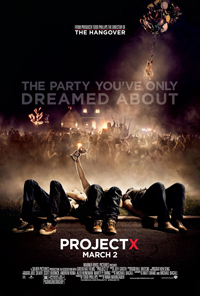 Project X, a film about a group of high-school students throwing an earth-shattering house party, will be released next week, so it seems like as good a time as any to investigate the cinematic phenomenon of the casa fiesta. Everybody likes a good time, especially if one is in the business of bottling and selling joy for the masses. Hollywood producers are and always have been just such folk. Classic fare such as Gone With the Wind and Giant are a couple of early examples of films that made good use of a grand, mansion-based galas to highlight important transitional moments in their stories. Yet as lavish as these shindigs were, they were hardly rowdy, and looked to be about as enjoyable as dinner with the in-laws. As far as this author is concerned, it’s not a party until a fight breaks out, the cops come, the venue gets trashed, and/or at least one person makes a complete ass of themselves. Today’s list honors the motion pictures that have embraced this philosophy.
Project X, a film about a group of high-school students throwing an earth-shattering house party, will be released next week, so it seems like as good a time as any to investigate the cinematic phenomenon of the casa fiesta. Everybody likes a good time, especially if one is in the business of bottling and selling joy for the masses. Hollywood producers are and always have been just such folk. Classic fare such as Gone With the Wind and Giant are a couple of early examples of films that made good use of a grand, mansion-based galas to highlight important transitional moments in their stories. Yet as lavish as these shindigs were, they were hardly rowdy, and looked to be about as enjoyable as dinner with the in-laws. As far as this author is concerned, it’s not a party until a fight breaks out, the cops come, the venue gets trashed, and/or at least one person makes a complete ass of themselves. Today’s list honors the motion pictures that have embraced this philosophy.
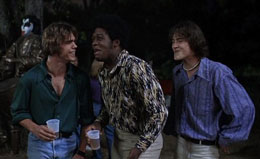 To make it into the pool of candidates for the ranking, the movie in question had to have presented a party that was being held in a house or established place of residence. While an amazing bash in its own right, because the party in Dazed and Confused took place in a field and not a house, it was excluded; the same disqualification applied to Bachelor Party, which was set mainly in a hotel suite. And while movies like Dead Poet’s Society, Can’t Hardly Wait, Revenge of the Nerds, American Pie, Porky’s and Superbad all had honorable and admirable house parties, there’s not a lot to say about them except that a bunch of people showed up, got wasted, then acted a fool. While that’s all well and good on a normal day, the films listed below took things to heights that would have elevated their parties into local legend. In other words, to make it into today’s discussion, the house party in question must have been so cataclysmic and debauchery-ridden that generations would have passed before tales of its epic nature passed into memory.
To make it into the pool of candidates for the ranking, the movie in question had to have presented a party that was being held in a house or established place of residence. While an amazing bash in its own right, because the party in Dazed and Confused took place in a field and not a house, it was excluded; the same disqualification applied to Bachelor Party, which was set mainly in a hotel suite. And while movies like Dead Poet’s Society, Can’t Hardly Wait, Revenge of the Nerds, American Pie, Porky’s and Superbad all had honorable and admirable house parties, there’s not a lot to say about them except that a bunch of people showed up, got wasted, then acted a fool. While that’s all well and good on a normal day, the films listed below took things to heights that would have elevated their parties into local legend. In other words, to make it into today’s discussion, the house party in question must have been so cataclysmic and debauchery-ridden that generations would have passed before tales of its epic nature passed into memory.
So, the crazier the party, the better! Factored criteria for judging position below included the amount and perceived consumption of alcohol at the party, size and scope of the event, the ‘happening’ factor of the gathering, and quality of entertainment for the guests. Thus, if the movie gave its audience a residential-based bash with free-flowing booze, in a choice venue, with a chic crowd, and a star attraction entertaining the guests, then it got pushed toward the front of the line. Some other last-minute exclusions not already mentioned included The Graduate, The King’s Speech, Say Anything, Teen Wolf, Uncle Buck and Porky’s. Anyway…
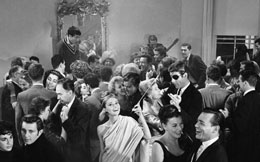 10. Breakfast at Tiffany’s (1961)
10. Breakfast at Tiffany’s (1961)
In Manhattan, a 450 sq. ft. one-bedroom walk-up is as close to a house as a person will get lest their last name is Rockefeller, Pierpont, or Morgan, so this one seemed appropriate, if only for a #10 nod. Audrey Hepburn’s Holly Golightly was a high-end call-girl and mafia runner, and came to the attention of the film’s main character after he moved into Holly’s apartment building. This guy, George Peppard’s Paul was immediately cock-struck by the dazzling, fast-paced, whimsical party-girl that was anything but the virginal ingenue her delicate disposition might have suggested. Holly had been around, and was already on a fast-track toward a gravy boat when the modest writer (Paul) came into her life. A pair of wounded souls, Paul and Holly were immediately drawn to each other, yet the latter remained largely distant due to her never-ending quest to marry-up and establish herself in comfortable digs.
Though on her way up the social ladder, the party she threw in her apartment early in the movie showed just how far she had to go, for the tight quarters of her abode, friskiness of the party, and popularity of its hostess all combined to create one hell of a log jam. There was swinging jazz, generously poured cocktails, and members of pretty much every social strata together, literally asses-to-elbows, enjoying the event as one. Naturally, it wasn’t long before the cops arrived on the scene, and busted up a party that looked more like the inside of a clown-car than your normal collection of revelers. Still, it was one hell of a party, and testament to Holly’s charms of persuasion, for to get a rager going at this level, yet in an even bigger venue, we’d have to turn to…
Now, how in the hell could I propose to write a list about cinematic house parties without bringing up 1990’s seminal film offering, the aptly titled House Party? Now 22 years old, this celebration of teenage exuberance and maturation hasn’t aged a day, except for the bright-as-fuck clothes, shitty music, and contrived character sketches drawn from a discarded ‘Cosby Show’ episode. A somewhat predictable story, especially when taken against the other pictures listed today, this one was also about a high school kid (Chris Martin’s Play) whose parents were going out of town, an event that clearly necessitated a rocking fiesta. While the subsequent House Party sequels wisely spent more time at the actual shin-digs, the original installment actually spent a majority of its time following the trials of Play’s best friend, Kid, who had to sneak out of his house to make it to the party.
On the way to the bash, Kid ran across some school bullies, a frat reunion, and an always-smooth George Clinton, who was spinning records at a party in the neighborhood. Once he got to the real gathering, however, the movie gave audiences all the revelry and jocularity expected of a picture sporting a name like House Party. There were smoking hot chicks, tasty beverages, a dance contest, and one of the first hip hop freestyle battles in movie history. Hell, the cops even showed up, yet this party was so damn cool, the fuzz only arrested the asshole bullies that had been giving Kid a hard time, and left pretty much everyone else alone. Because of the party, both Kid and Play seemed to have lined themselves up nicely for a little action with some choice ladies, something that likely evened out the severe ass-whooping Kid received once he got home, and had to face his father’s belt-wrath. Yet as good as it was, if this film had been a little less concerned with presenting a positive, parent-approved message to kids, it might just have edged out the debauchery seen in …
The cinematic conduit for teenage angst and indecision, John Hughes knew what an amazing party could lend to the lives of up-and-coming adolescents. It should come as no surprise, then, that Sixteen Candles is but one of two Hughes films on today’s list (no peeking!), for the director clearly grasped what made an epic party, and how a movie could use that seminal event to color and define the lives of those involved. In Sixteen Candles, the film’s main character, Molly Ringwald’s Sam Baker, struggled to come to grips with a number of earth-shattering milestones oft encountered in the life of a mid-western American teenager. A seemingly anonymous sophomore, Sam spent the handful of days the movie followed pining over the hunky senior Jake while she contended with a pushy clan of extended relatives that had invaded her house for the occasion of her older sister’s wedding. The stress of this situation would have been enough to weaken an already pencil-thin resolve, but Sam also suffered the indignity of her sweet-16 passing by unnoticed (because of all the wedding hoopla), and the dreamboat senior Jake finding a private quiz Sam had completed which detailed her love of him.
Oh, and Sam’s panties were also on the loose. With all this popping off, it’s a miracle that the red-headed sophomore didn’t just up and steal the family car for a coke-fueled birthday trip to Vegas (this WAS the 80’s, after all). But Sam was a good girl. Hell, she didn’t even go to Jake’s wild, hedonistic senior-afterparty, which sprung to life because of the ambitious machinations of Jake’s worthless friends. Clearly a rich kid, Jake’s house offered the perfect venue for a free-roving band of locust-like teenagers looking to consume and/or destroy everything in their path. What followed was a celebratory house-fiesta that would have made Caligula proud. Though the audience got a pretty decent look at the party, what really impressed this author was the staggering amount of destruction catalogued after the fact. As Jake wandered the tattered ruins of his casa, all manner of evidence spoke to the complete, unencumbered nature of the party. Shit, Jake even found himself a person after a little cleaning up (Anthony Michael Hall’s The Geek). A full-on party the likes of which are seen maybe once in a decade, it would have needed even more damage, as well as whores, to beat out …
There was a time, long, LONG ago, when people didn’t see Tom Cruise coming from a mile away. The brash young kid with a million dollar smile slid into the American mainstream with Risky Business, and has mostly stuck around ever since, due in large part to the innocent charm mixed with a fiery intensity few have equaled before or since. The passion Cruise has brought to his work has always been an integral part of his success, for behind that wolf’s grin there lies a sleeping dragon. This particular character-trait was used to brilliant effect in the young man’s cinematic coming-out party, Risky Business, where Cruise played the wide-eyed Joel Goodson, an upper-crust high-school brat with more problems than pimples. Joel learned early on in the film that his parents were leaving town, something he saw as the perfect opportunity to nip at the old man’s scotch and do a little underwear dancing. Joel’s friends saw the larger possibilities that their buddy’s situation afforded, however, and made damn sure a swanky, upscale house devoid of parents didn’t go underutilized.
In the simplest of terms, this meant whores. While the first ordered hooker turned out to be a tranny, the second was of far better stock (Rebecca De Mornay’s Lana). Yet this is where shit started going south for Joel. The whore (Lana) robbed his house, then got Joel in deep with her pimp, Joe Pantoliano’s Guido. As bad as this was, it had nothing on the next development in the picture, which saw the Porsche 928 belonging to Joel’s father driven into a goddamned lake. So that he could raise the money to get his mother’s valuable antiques back from Guido, not to mention clean and repair his pop’s ride, Joel threw a call girl-party using Lana’s whore connections. The result was a high school rager Chicago’s North Shore neighborhood likely never forgot. Virginal high school boys with loads packed in so tight that they could have lacquered a board room table got a chance to tangle with high-end pussy they’d have normally been lucky to view at fifty paces. The party was hosted in a lavish residence with booze for days and an erotic entertainment factor hard to beat at a high school gathering. Had things gotten a bit rowdier, and escalated to levels that demanded riot gear, the party in Risky Business might have jumped ahead of …
Hip-hop ragers and whorehouse kegers are fine for your high-school crowd, but when professional, tournament-ready drinkers grace a house party, things escalate rather quickly. This was definitely the case for the unnamed Colorado household that unknowingly hosted one of many on-site training sessions conducted by America’s unofficial Beerfest squad. The team, captained by the Wolfhouse brothers, strolled into a house party they’d discovered so as to challenge a bunch of university brats to a few rounds of drinking games. The Wolfhouse squad was prepping for a return to the annual underground Beerfest in Munich, Germany, and were in need of some practical competitive conditioning. For this they turned to the aforementioned college party, and immediately got to work going head-to-head against the very best hitters the amateur circuit could offer. Indeed, if sharpening one’s skills to go up against hardened competitive drinkers of hearty German stock, there’s not a lot more a person can ask for than power-chugs against some 19-year-old ass-wipe with a pink liver.
A lively, raucous, liquor-soaked celebration of alcoholic excess, the house party blessed by the Wolfhouse crew became exponentially cooler with their arrival. Not only were there fierce drinking games, a seemingly never-ending supply of booze, a care-free vibe, and a full-blown boxing match tailored by the wedding outfits of the absent hosts, the fucking cops had to come in to break the thing up it was so damn wild. Risky Business may have had high-end whores and a fancier venue, but the kids who attended the Wolfhouse-crashed party likely would have spoken about it for decades. For one night, those college pukes got to share quality boozin’ time with seasoned professionals, nay, soon to be world champions. While another Broken Lizard film, Super Troopers, also had a pretty hopping and impromptu house party near its end, the level of debauchery and extended period of time committed to the vignette in Beerfest gave this bash the edge.
God help me, I hate this movie. It’s enough to drive one insane, watching as people, nay, valued friends with trusted opinions all declare their love and admiration for an air-brushed romp down memory lane. The characters in Almost Famous were so laughably one-dimensional and translucent that, at times, it made one wonder if they weren’t simply cardboard cut-outs propped up in front of the camera. The people who give this movie credit for being deep make me sad: like in the way you’re sad for children who will one day discover the myth of Santa Claus. What was so surprising about the journey of William (Patrick Fugit), a teenager from the suburbs who was shocked by the excess and callous indifference of famous rock stars? I’m sorry, is any of that news to anybody? Which is all aside from the fact that this movie was supposed to be about rock and roll, and the 1970s, yet it spoke to a narrow sub-section of society that lived a privileged life so far outside the norm that only a handful of people could possibly have related to the events portrayed. Jesus, how many people got a chance to meet their rock-god idols, and go on tour with them? As interesting a concept as that is for a movie, it was hardly relatable, and, again, far from original in its message (mainly that fame is an empty sham).
So, what did that leave us with? The story of a kid learning the hard way that one’s heroes are rarely what they’re cracked up to be, and that groupies are unrepentant whores? Who needed a new movie to get that state secret out? And this might have been worth the trip to the cinema had Almost Famous at least had the convictions to finish what it started! But no! William, his mother, and sister all reconciled at the end, the famous rock star (Billy Crudup’s Russell) did the right thing and sacrificed his career for some punk nobody, and everybody lived happily ever after. Oh wait! You know what? I was wrong. That IS how everything worked out for America in the 70s. My bad.
What a minute? What were we talking about? How did we get here? Oh yeah: house parties. Yeah, I guess Almost Famous had a pretty good one, what with a bunch of kids in the suburbs finding a famous rock guitarist at their doorstep, looking to drop acid and make speeches to the wide-eyed masses from the rooftops. Bah, this movie sucked.
This one’s ranking does not appropriately honor the size, scope, or quality of the party that took place near the end of P.C.U., something that says more about the company it keeps today than of the quality of the film or its house party, per say. In the film, Jeremy Piven’s Droz and his collection of college miscreants in “The Pit” needed to raise money to pay an outrageous (though largely valid) damage bill that their antics had run up at Port Chester University. Though not a fraternity in name, Droz and the gang represented part of what remained of Port Chester’s forcibly retired Greek system. While Droz and his cronies enjoyed the luxury of living and partying in their Frat’s former house (The Pit), a right-wing splinter cell of their order lived in exile, and plotted a return to their former home. David Spade played Rand, the leader of this expelled group of Reaganite scum, and it was Rand who worked with the evil, fun-hating school Dean to make a case to have Droz and his cohorts evicted from The Pit.
So as to raise the funds needed to pay the damage bill, Droz coordinated a party to save the day. When that failed, the man personally took it upon himself to see the damn thing through. This meant “borrowing” a car, stealing two kegs, hijacking a full bar, torpedoing a protest, halting a riot, and booking George Clinton and Parliament Funkadelic to play a set. No shit, he did all that, and in under an hour. The results were not simply impressive: they were immortal. For one night, all the rival factions of Port Chester’s various human and civil rights groups got together in the name of fun and funk, and for what looked like half an hour or so, there seemed to be one hell of a party. (Shit, Naked Guy was even there!) Had the bash gone on a bit longer, and not charged for use of the bathroom, it might have snuck by this next house party, one that has gone down in movie history …
Back in the day, when godly titans like John Belushi were still alive, by jove, people partied. Not just that, they made epic, landscape altering films about partying that elevated not just the cinematic genre, but also the very medium of merry-making to a whole new level. The astonishing influence Animal House had on the world in the years following its release speak to the hedonistic impulses living inside all human beings, since the days of Dionysius and before. The film’s leads, young adults wise in the ways of hard, liver-punishing collegiate excess, knew that they were on double-secret probation, and that their balls were within inches of striking the buzz-saw. Their plans to cheat on an upcoming psychology test foiled, they did what any life-loving frat boy would do: they threw a toga party! Sneering at convention, the boys of Delta Tau Chi threw one of the wildest, loudest, chick-heavy parties the college world has ever known, and the world remembered them for it.
Fueled by the cutting-edge rock and roll majesty of Otis Day and the Knights, the Deltas threw a party so red hot it’s hard to imagine anybody got away without getting laid. Truth be told, there was enough evidence to support that most prospered in just such a regard. Otter (Tim Matheson) bagged the dean’s gin-soaked whore of a wife, and Pinto (Thomas Hulce) accidentally snagged himself a 13-year-old piece of jailbait that nearly spelled the end of the young man (Scene-Stealers does not support, champion, or condone such behavior). In all, though, it was one hell of a party. The band was rocking, the crowd was dancing, booze was flowing, and honest Bluto (John Belushi) roamed with vigilance, looking to stamp out sickening folk ballads or other mood-killing swill. Though the cops didn’t bust anything up, and there was certainly more room for destruction at the Delta’s house party, theirs did last longer than Droz’s fundraiser at the Pit, and the immortal status of the toga party in film history, along with the trend-setting standard it set for the rest of time, got it a slot in the Top 3, one right behind …
It’s good to have true friends. These are the kinds of buddies that abandon their domestic lives to help a lifelong friend get through a crisis. True friends are the ones that temporarily forget about careers, relationships, or even self-respect so that another person in their trusted circle can receive the total support needed to get them through a tough trial. In Old School, Luke Wilson’s Mitch was a man lucky enough to have such men of men around him, for when he learned that his whore girlfriend had been engaging in random sex-orgies during his business absences, he needed support. Mitch left the woman and the home they shared, and ended up in a large house that was only blocks away from the main campus of fictional Harrison University. Vince Vaughn’s Beanie was a friend of Mitch’s from childhood, and immediately saw the opportunities available to a recently single man knee deep in college poon. So as to get the ball rolling, Beanie threw Mitch a house party, one that would be remembered at Harrison University for the rest of time.
Even before the party’s main entertainment went on for the evening, it appeared like a wild success. Styled as “Mitchapalooza,” the event Beanie coordinated was stocked with prime college ass, multiple kegs, a hard-A bar, and enough youthful enthusiasm to launch a candidate into the Senate. When Mitch asked Beanie about the party’s main event, and the stage that had been set up, Beanie’s response essentially said it all. “Mitch, I own six Speaker Cities. I’m worth three and a half million dollars that the I.R.S. knows about. I got more electronics up there than a damn KISS concert. You think I’m gonna roll out this type of red carpet for a fucking marching band?” The statement was hardly bravado. When the house party’s concert started, all in attendance discovered that the king of all pimps, Snoop Dogg himself, was the evening’s M.C. Sure, P.C.U. might have had George Clinton and Parliament giving a performance no less outstanding, yet The Pit couldn’t compete with the spacious, well-organized party machine Beanie had assembled. And while Animal House gave the world an immortal party better than any other offered up to that point, Snoop Dogg’s appearance set a new standard, one that could only be outdone with the inclusion of a biker gang and a thermonuclear warhead into the festivities …
Yeah, this was the best house party in movie history, hands down. To start, it was completely stocked with food and beverages due to the magical benevolence of the co-hostess, Lisa (Kelly LeBrock). If that wasn’t enough, if having one’s party catered by a fucking genie wasn’t enough, “Gary” (Anthony Michael Hall) and Wyatt (Ilan Mitchell-Smith) also enjoyed the benefit of every schoolmate of notable social standing at their shin dig, which included two of the most beautiful girls in town (a pair Gary and Wyatt had been eyeing for some time). To add another log on the fire, this party was being held inside a multi-storied mansion with enough elbow-room to house a small Prince concert, and provided the setting for one of the most rousing finales a house party has ever known (in film or otherwise). Not only did a roving band of mutant bikers straight out of a Mad Max film show up halfway through the evening, Gary and Wyatt actually stepped up, in front of their guests, and ran the rowdy bastards out. Understand, this was after the biker gang had crashed through the windows and doors of the estate mid-party, and had flashed shotguns and leash-bound chicks at the crowd for intimidating effect.
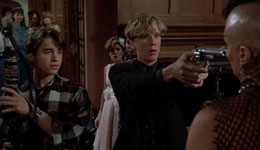 Not only did Gary and Wyatt scare these assholes off, they went ahead and kept the party going, and shacked up with their respective ladies for the evening. This wasn’t all, either. The party was so damn awesome, it also had a magic chimney, a blue kitchen, animated paintings, and the sudden appearance of a Pershing Intercontinental Ballistic Missile. Nukes! This party was so wild, it had fucking nukes! While it didn’t sport a musical act as radiantly awesome as Parliament or Snoop Dogg, one has to submit that sorcery and the arrival of a nuclear payload into a party elevates things to levels men and women were likely not meant to approach. Only time will tell if Project X will provide a house party with clout enough to de-throne Weird Science from the top of this list, but for my part, I hope it does not. Indeed, how could one hope to beat out such excess lest they run the risk of flying a bit close to the sun: one whose heat is enough to melt the wax holding together the loftiest house-party dreams?
Not only did Gary and Wyatt scare these assholes off, they went ahead and kept the party going, and shacked up with their respective ladies for the evening. This wasn’t all, either. The party was so damn awesome, it also had a magic chimney, a blue kitchen, animated paintings, and the sudden appearance of a Pershing Intercontinental Ballistic Missile. Nukes! This party was so wild, it had fucking nukes! While it didn’t sport a musical act as radiantly awesome as Parliament or Snoop Dogg, one has to submit that sorcery and the arrival of a nuclear payload into a party elevates things to levels men and women were likely not meant to approach. Only time will tell if Project X will provide a house party with clout enough to de-throne Weird Science from the top of this list, but for my part, I hope it does not. Indeed, how could one hope to beat out such excess lest they run the risk of flying a bit close to the sun: one whose heat is enough to melt the wax holding together the loftiest house-party dreams?




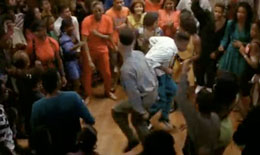
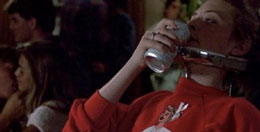
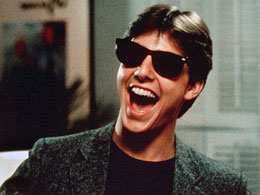
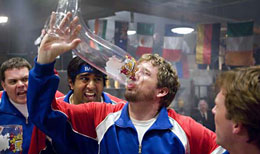
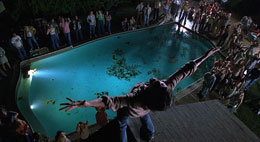
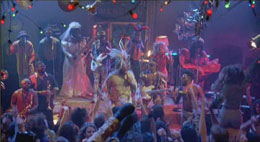
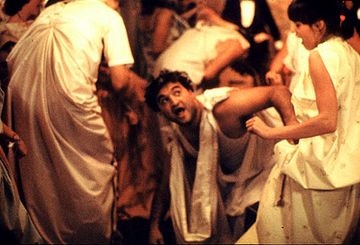
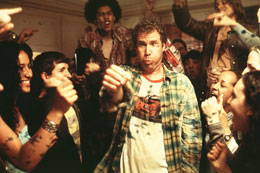
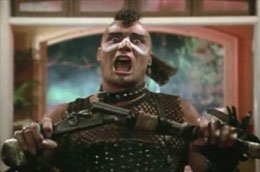

{ 3 comments }
Per what you said about Almost Famous – the callousness of rockstars probably would be “news” to a fifteen-year-old kid, especially back in 1973, when the press was not as edgy about what it covered. Do you remember what it was like being 15? When I was, I still thought my favorite rockstars were the heroes of the world. It actually took me til about 18 or 19 to realize that was bullshit, but I also believed in Santa Claus til I was 12, so maybe that’s just my problem.
Regardless, I could not disagree with you more about Almost Famous. What makes the characters “one-dimensional”? Did you really not see a transformation in William, or the bubbling of his inner angst earlier in the film that was supressed by his sweet nature? Underneath the “free love” activities and spontaneous nature of Penny Lane, do you not see someone yearning for more stability and unconditional love? In Russel, do you not see a rockstar who is feeling the walls of the bus closing in on him, so to speak, even though he knows what the problem is yet continues to live the way he does? In all the film’s characters, do you not see people who have come to live by their ideals, only to find there is often very little room for them in the real world? And the title is beyond perfect, as well – all the characters are almost famous, in some way, just as they are, to put it cheesily, “almost grown-ups”.
It sounds to me like you’ve just convinced yourself you hate this movie in response to its overwhelming praise. I’m sure you’ve heard this all before, but really, your argument seems more based on unchecked emotinoal responses than it does on what the movie actually has to offer. It may not be totally relateable – no, not everyone writes for magazines at 15 and gets to tour with bands they love – but that part of it almost plays into a fantasy aspect held by music geeks all over the globe like myself. I’m sure at this point, though, there is nothing that can change your mind about this movie, and that makes me sad.
On a lighter note – it was a great pleasure to meet you last weekend! I hope we get the change to party again sometime. Cheers!
Weird Science was the best one.
Megan – agreed 🙂
Comments on this entry are closed.